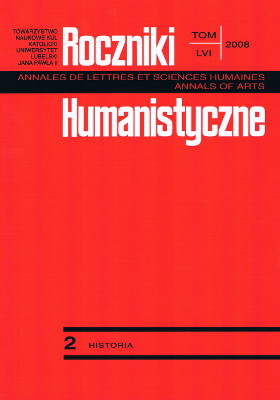Wyprawa pozwolska Zygmunta Augusta w 1557 roku
Abstrakt
Sigismund August’s Poswole expedition of 1557 was the king’s first military campaign. It followed a conflict between the hierarchies of the Inflant Order and the Ryga bishop favoured by the Prussia prince and the Polish king. The conflict concerned coadjutory.
In the end of August 1557 the Polish-Lithuanian army, led by Jan Mielecki, Mikołaj Czarny Radziwiłł, and Mikołaj Rudy Radziwiłł, camped in Poswole on the border with the religious state. The army was composed of Polish units, popular defence, and the Lithuanian levy in mass supported by private detachments, a numerous artillery, and a laager. There were, however, only some minor fights on the border. The Master of the Inflanty Order, Wilhelm Fürstenberg, in the face of the outnumbering armies of Sigismund August and Albrecht Hohenzollern, arrived at the camp of the allies in Poswole and humbled himself before the king.
The treaty signed in Poswole directly affected the Moscow intervention in the Inflanty and the conflict with Ivan IV the Terrible. A part of the Inflanty was occupied by Sweden and Denmark. It was also an initiative to include Inflanty into Poland in 1561.
Bibliografia
Jasnowski J., Mikołaj Czarny Radziwiłł (1515-1565). Kanclerz i marszałek ziemski Wielkiego Księstwa Litewskiego, wojewoda wileński (Rozprawy Historycznego Towarzystwa Naukowego, t. 22), Warszawa 1939.
Karwowski S., Wcielenie Inflant do Polski 1558-1563, Poznań 1873.
Kłodziński A., Stosunki Polski i Litwy z Inflantami przed zatargiem z r. 1556/1557, „Kwartalnik Historyczny” 22(1908).
Korzon T., Dzieje wojen i wojskowości w Polsce, t. I: Epoka przedrozbiorowa, Warszawa 1923.
Plewczyński M., Daj nam, Boże, sto lat wojny. Dzieje niemieckich lancknechtów 1477-1559, Warszawa 1997.
Sucheni-Grabowska A., Zygmunt August. Król polski i wielki książę litewski 1520-1562, Warszawa 1996.
Copyright (c) 2008 Roczniki Humanistyczne

Utwór dostępny jest na licencji Creative Commons Uznanie autorstwa – Użycie niekomercyjne – Bez utworów zależnych 4.0 Międzynarodowe.





